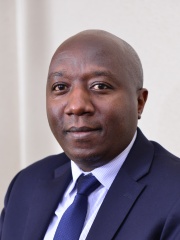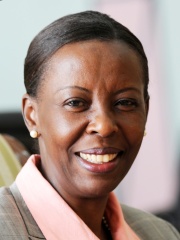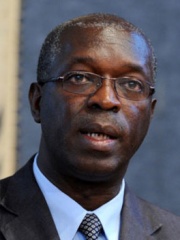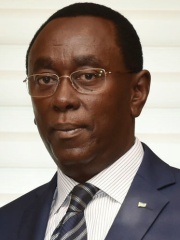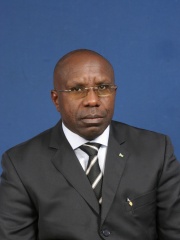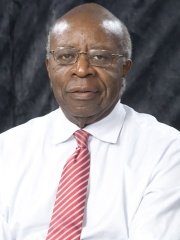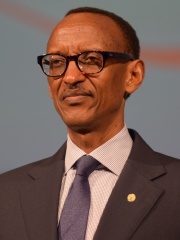
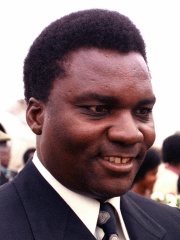
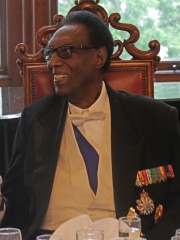
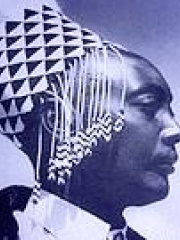
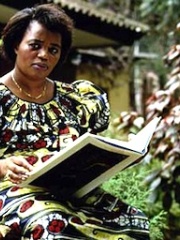
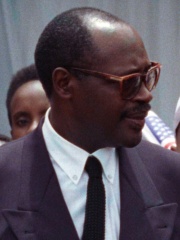
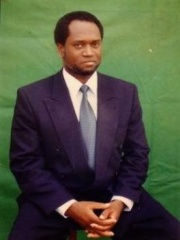
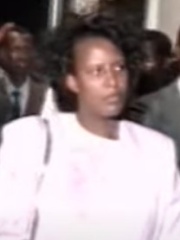
The Most Famous
POLITICIANS from Rwanda
This page contains a list of the greatest Rwandan Politicians. The pantheon dataset contains 19,576 Politicians, 18 of which were born in Rwanda. This makes Rwanda the birth place of the 113th most number of Politicians behind Democratic Republic of the Congo, and Guinea.
Top 10
The following people are considered by Pantheon to be the top 10 most legendary Rwandan Politicians of all time. This list of famous Rwandan Politicians is sorted by HPI (Historical Popularity Index), a metric that aggregates information on a biography's online popularity. Visit the rankings page to view the entire list of Rwandan Politicians.

1. Paul Kagame (b. 1957)
With an HPI of 69.37, Paul Kagame is the most famous Rwandan Politician. His biography has been translated into 81 different languages on wikipedia.
Paul Kagame ( kə-GAH-may; born 23 October 1957) is a Rwandan politician and former military officer who has been the President of Rwanda since 2000. He was previously considered Rwanda's de facto leader between 1994 and 2000, while Vice President and Minister of Defence under President Pasteur Bizimungu, until assuming the Presidency in 2000. He was previously a commander of the Rwandan Patriotic Front (RPF), a rebel armed force which invaded Rwanda in 1990. The RPF was one of the main belligerents of the Rwandan Civil War and was the armed force which ended the 1994 Rwandan genocide. Born to a Tutsi family in southern Rwanda that fled to Uganda when he was two years old, Kagame spent the rest of his childhood there during the Rwandan Revolution, which ended Tutsi political dominance. In the 1980s, Kagame fought in Yoweri Museveni's rebel army becoming a senior Ugandan army officer after many military victories led Museveni to the Ugandan presidency. Kagame joined the RPF, taking control of the group when previous leader Fred Rwigyema died on the second day of the 1990 invasion. By 1993, the RPF controlled significant territory in Rwanda and a ceasefire was negotiated. The assassination of Rwandan President Juvénal Habyarimana set off the genocide, in which Hutu extremists killed an estimated 500,000 to 800,000 Tutsi and moderate Hutu. Kagame resumed the civil war and ended the genocide with a military victory. During his vice presidency, Kagame controlled the national army and was responsible for maintaining the government's power, while other officials began rebuilding the country. Many RPF soldiers carried out retribution killings. Kagame said he did not support these killings but failed to stop them. Hutu refugee camps formed in Zaire and other countries and the RPF attacked the camps in 1996, but insurgents continued to attack Rwanda. As part of the invasion, Kagame sponsored two rebel wars in Zaire. Rwandan- and Ugandan-backed rebels won the first war (1996–97), installing Laurent-Désiré Kabila as president in place of dictator Mobutu Sese Seko and returning Zaire to its former pre-Mobutu name, the Democratic Republic of the Congo (DRC). The second war was launched in 1998 against Kabila, and later his son Joseph, following the DRC government's expulsion of Rwandan and Ugandan military forces from the country. The war escalated into a conflict that lasted until a 2003 peace deal and ceasefire. Bizimungu resigned in 2000, most likely having been forced to do so, following a falling out with the RPF. He was replaced by Kagame. Bizimungu was later imprisoned for corruption and inciting ethnic violence, charges that human rights groups described as politically motivated. Kagame's rule is considered authoritarian, and human rights groups accuse him of political repression. Overall opinion on the regime by foreign observers is mixed, and as president, Kagame has prioritised national development, launching programmes which have led to development on key indicators including healthcare, education and economic growth. Kagame has had mostly good relations with the East African Community and the United States; his relations with France were poor until 2009. Relations with the DRC remain tense despite the 2003 ceasefire; human rights groups and a leaked United Nations report allege Rwandan support for two insurgencies in the country, a charge Kagame denies. Several countries suspended aid payments in 2012 following these allegations. Since coming to power, Kagame has won four presidential elections, but none of these have been rated free or fair by international observers. His role in the assassination of exiled political opponents has been controversial.

2. Juvénal Habyarimana (1937 - 1994)
With an HPI of 69.34, Juvénal Habyarimana is the 2nd most famous Rwandan Politician. His biography has been translated into 55 different languages.
Juvénal Habyarimana (Kinyarwanda: [hɑβɟɑːɾímɑ̂ːnɑ]; French: [ʒyvenal abjaʁimana]; 8 March 1937 – 6 April 1994) was a Rwandan politician and military officer who was the second president of Rwanda, from 1973 until his assassination in 1994. He was nicknamed Kinani, a Kinyarwanda word meaning "invincible". An ethnic Hutu, Habyarimana served in several security positions including minister of defense under Rwanda's first president, Grégoire Kayibanda. After overthrowing Kayibanda in a coup in 1973, he became the country's new president and eventually continued his predecessor's pro-Hutu policies. He was a dictator, and electoral fraud was suspected for his unopposed re-elections: 98.99% of the vote on 24 December 1978, 99.97% of the vote on 19 December 1983, and 99.98% of the vote on 19 December 1988. During his rule, Rwanda became a totalitarian, one-party state in which his MRND-party enforcers required people to chant and dance in adulation of the president at mass pageants of political "animation". While the country as a whole had become slightly less impoverished during Habyarimana's tenure, the great majority of Rwandans remained in circumstances of extreme poverty. In 1990, the Tutsi-led Rwandan Patriotic Front (RPF) launched the Rwandan Civil War against his government. After three years of war, Habyarimana signed the Arusha Accords in 1993 with the RPF as a peace agreement. The following year, he died under mysterious circumstances when his plane, also carrying the President of Burundi, Cyprien Ntaryamira, was shot down by a missile near Kigali. His assassination ignited ethnic tensions in the region and helped spark the Rwandan genocide.

3. Kigeli V of Rwanda (1936 - 2016)
With an HPI of 66.52, Kigeli V of Rwanda is the 3rd most famous Rwandan Politician. His biography has been translated into 26 different languages.
Kigeli V Ndahindurwa (born Jean-Baptiste Ndahindurwa; 29 June 1936 – 16 October 2016) was the last ruling King (Mwami) of Rwanda, from 28 July 1959 until the end of the UN-mandate with Belgian administration and the declaration of an independent Republic of Rwanda 1 July 1962. On 25 September 1961, a referendum voted for the abolition of the Rwandan monarchy following the Rwandan Revolution. After a brief period of moveabouts after leaving Rwanda, the titular King lived in exile during the final part of his life in the town of Oakton, Virginia, in the United States. In exile, he was known for heading the King Kigeli V Foundation, an organisation promoting humanitarian work for Rwandan refugees. He was also notable for his activities in maintaining the dynastic, cultural heritage of his formerly reigning royal house, including noble titles, dynastic orders of chivalry and other distinctions. After the king's death, a successor was said to be shortly revealed. In January 2017, it was announced that Yuhi VI would succeed him. Yuhi VI is the nephew of both the late King Kigeli V and the previous King Mutara III, as well as a grandson of King Yuhi V.

4. Mutara III Rudahigwa (1911 - 1959)
With an HPI of 62.72, Mutara III Rudahigwa is the 4th most famous Rwandan Politician. His biography has been translated into 17 different languages.
Mutara III Rudahigwa (March 1911 – 25 July 1959) was King (umwami) of Rwanda between 1931 and 1959. He was the first Rwandan king to bring Catholicism to the country, being baptised Charles Léon Pierre. He is thus sometimes referred to as Charles Mutara III Rudahigwa.
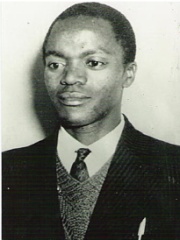
5. Grégoire Kayibanda (1924 - 1976)
With an HPI of 61.25, Grégoire Kayibanda is the 5th most famous Rwandan Politician. His biography has been translated into 30 different languages.
Grégoire Kayibanda (1 May 1924 – 15 December 1976) was a Rwandan politician and revolutionary who was the first elected President of Rwanda from 1962 to 1973. An ethnic Hutu, he was a pioneer of the Rwandan Revolution and led Rwanda's struggle for independence from Belgium, replacing the Tutsi monarchy with a republican form of government. Rwanda became independent from Belgium in 1962, with Kayibanda serving as the country's first president, establishing a pro-Hutu policy and a de facto one-party system governed by his party, Parmehutu. He was overthrown in a coup d'état in 1973 by his defense minister, Juvénal Habyarimana, and died three years later.

6. Agathe Uwilingiyimana (1953 - 1994)
With an HPI of 61.12, Agathe Uwilingiyimana is the 6th most famous Rwandan Politician. Her biography has been translated into 29 different languages.
Agathe Uwilingiyimana (Kinyarwanda: [u.wǐː.ɾiː.ɲɟi.jí.mɑ̂ː.nɑ]; 23 May 1953 – 7 April 1994), sometimes known as Madame Agathe, was a Rwandan political figure. She served as Prime Minister of Rwanda from 18 July 1993 until her assassination on 7 April 1994, during the opening stages of the Rwandan genocide. She was also Rwanda's acting head of state in the hours leading up to her death. She was Rwanda's first and so far only female prime minister.

7. Pasteur Bizimungu (b. 1950)
With an HPI of 60.25, Pasteur Bizimungu is the 7th most famous Rwandan Politician. His biography has been translated into 34 different languages.
Pasteur Bizimungu (born 30 April 1950) is a Rwandan politician who served as the third President of Rwanda, holding office from 19 July 1994 until 23 March 2000. Bizimungu had previously held several positions under President Juvenal Habyarimana throughout the 1980s. He joined the Rwandan Patriotic Front (RPF) rebel group against Habyarimana in 1990 following the death of his brother seemingly under the orders of Habyarimana's government. After the RPF's victory in the Rwandan Civil War in 1994 which ended the Rwandan genocide, Bizimungu became the new president of the country with RPF commander Paul Kagame as vice-president and minister of defense, who was seen as the country's de facto leader throughout his presidency. Bizumungu's presidency was marked by the reconstruction of the country in the wake of the civil war and genocide, as well as the country's support for rebel groups in the First Congo War from 1996 to 1997, and the Second Congo War from 1998 to 2003. Following a series of disputes with Kagame, Bizimungu resigned in 2000, whereupon he was succeeded by Kagame. The following year, Bizimungu founded the Party for Democratic Renewal, which was immediately banned by Kagame's new government. In 2004, Bizimungu was sentenced to fifteen years in prison for attempting to form a militia, inciting violence, and embezzlement, but was pardoned three years later by Kagame.

8. Melchior Ndadaye (1953 - 1993)
With an HPI of 58.93, Melchior Ndadaye is the 8th most famous Rwandan Politician. His biography has been translated into 36 different languages.
Melchior Ndadaye (28 March 1953 – 21 October 1993) was a Burundian banker and politician who became the first democratically elected and first Hutu president of Burundi after winning the landmark 1993 election. Though he attempted to smooth the country's bitter ethnic divide, his reforms antagonised soldiers in the Tutsi-dominated army, and he was assassinated amidst a failed military coup in October 1993, after only three months in office. His assassination sparked an array of brutal tit-for-tat massacres between the Tutsi and Hutu ethnic groups, and ultimately led to the decade-long Burundi Civil War.

9. Sylvie Kinigi (b. 1952)
With an HPI of 56.62, Sylvie Kinigi is the 9th most famous Rwandan Politician. Her biography has been translated into 36 different languages.
Sylvie Kinigi (née Ntigashira; born 24 November 1953) is a Burundian politician and economist who served as prime minister of Burundi from 10 July 1993 to 7 February 1994, and acting president from November 1993 to 5 February 1994, making her the second African woman to serve as a president. Born to a Tutsi family, she earned a degree in banking from the University of Burundi in 1979 and another diploma from the Centre de Formation de la Profession Bancaire in Paris. Politically, Kinigi was closely affiliated with the Union pour le Progrès national (UPRONA), Burundi's only legal political party at the time, and was an active member of the Union des Femmes Burundaises, a subgroup of UPRONA, serving as a member of its central committee by 1987. In that capacity she lobbied for legislative changes and government measures to benefit women. In 1990 Kinigi was hired by the Bank of the Republic of Burundi to direct its department of research and statistics, and the following year she was placed in charge of Burundi's structural adjustment program. In the summer of 1993 Burundi hosted free elections, which were won by UPRONA's rival, Front pour la Démocratie au Burundi (FRODEBU). The new FRODEBU President of Burundi, Melchior Ndadaye, appointed Kinigi prime minister of Burundi on 10 July. Kinigi wished to pursue economic development while she was prime minister, but thought that this could not be achieved until ethnic tensions between Tutsis and Hutus were reduced. Thus, she declared that ethnic reconciliation would be her top priority. On 21 October President Ndadaye and several other officials were killed by Tutsi soldiers in a coup attempt, leaving her the highest-ranking official alive and the de facto head of state of Burundi. She joined her surviving ministers in the French embassy until she could return to her residence under French military guard as the coup failed. Though her government proved unable to contain the ethnic violence following the coup, she played a key role in brokering a political compromise that allowed for the election of Cyprien Ntaryamira as the next president. She resigned when he took office in 1994 and assumed an executive position at the Banque Commerciale du Burundi. She then held several international positions before returning to Burundi in 2008 and becoming an independent economic consultant.
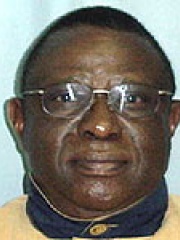
10. Théoneste Bagosora (1941 - 2021)
With an HPI of 56.09, Théoneste Bagosora is the 10th most famous Rwandan Politician. His biography has been translated into 20 different languages.
Théoneste Bagosora (16 August 1941 – 25 September 2021) was a Rwandan military officer. He was chiefly known for his key role in the 1994 Rwandan genocide for which he was sentenced to life imprisonment by the International Criminal Tribunal for Rwanda (ICTR). In 2011, the sentence was reduced to 35 years' imprisonment on appeal. He was due to be imprisoned until he was 89. According to René Lemarchand, Bagosora was "the chief organizer of the killings". On 25 September 2021, he died in a prison hospital in Mali, where he was being treated for heart issues.
People
Pantheon has 18 people classified as Rwandan politicians born between 1911 and 1973. Of these 18, 9 (50.00%) of them are still alive today. The most famous living Rwandan politicians include Paul Kagame, Pasteur Bizimungu, and Sylvie Kinigi. The most famous deceased Rwandan politicians include Juvénal Habyarimana, Kigeli V of Rwanda, and Mutara III Rudahigwa.
Living Rwandan Politicians
Go to all RankingsPaul Kagame
1957 - Present
HPI: 69.37
Pasteur Bizimungu
1950 - Present
HPI: 60.25
Sylvie Kinigi
1952 - Present
HPI: 56.62
Édouard Ngirente
1973 - Present
HPI: 55.87
Jean Kambanda
1955 - Present
HPI: 54.49
Louise Mushikiwabo
1961 - Present
HPI: 51.26
Anastase Murekezi
1952 - Present
HPI: 50.48
Bernard Makuza
1961 - Present
HPI: 48.69
Pierre Habumuremyi
1961 - Present
HPI: 44.29
Deceased Rwandan Politicians
Go to all RankingsJuvénal Habyarimana
1937 - 1994
HPI: 69.34
Kigeli V of Rwanda
1936 - 2016
HPI: 66.52
Mutara III Rudahigwa
1911 - 1959
HPI: 62.72
Grégoire Kayibanda
1924 - 1976
HPI: 61.25
Agathe Uwilingiyimana
1953 - 1994
HPI: 61.12
Melchior Ndadaye
1953 - 1993
HPI: 58.93
Théoneste Bagosora
1941 - 2021
HPI: 56.09
Dominique Mbonyumutwa
1921 - 1986
HPI: 55.04
Faustin Twagiramungu
1945 - 2023
HPI: 53.68
Overlapping Lives
Which Politicians were alive at the same time? This visualization shows the lifespans of the 9 most globally memorable Politicians since 1700.

